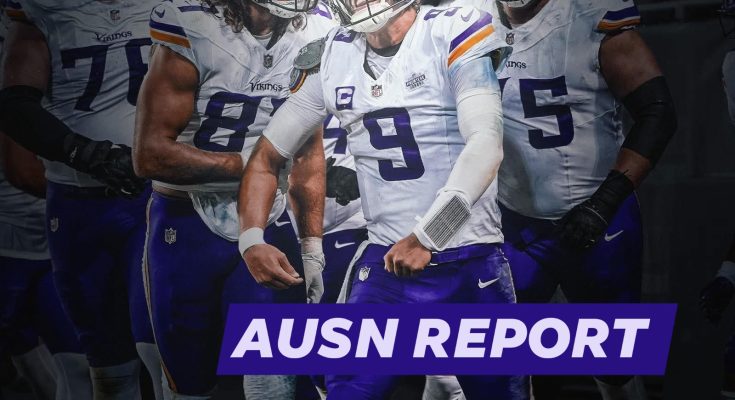The third quarter of Monday night’s game against the Bears was not going according to plan. The team was flat, the energy was low, and the momentum—so critical in this kind of contest—had clearly swung to the other side. On the sidelines, players were frustrated, coaches were pacing, and the fans, though still loud, had grown restless. In the huddle, after yet another unsuccessful drive, the weight of the moment settled on the team like a heavy fog. That’s when J.J. McCarthy did something that stood out—not in a flashy way, not in a showboat way, but in a way that spoke volumes about who he is and the kind of teammate he aspires to be.
He looked around at the faces in the huddle, scanning the eyes of his linemen, his receivers, his backs—guys he had sweated with, bled with, trained with, trusted. And in a moment that was quiet but powerful, he asked, “Is there anywhere else in the world you would rather be?”
The question hung in the air. It wasn’t rhetorical, even if no one immediately answered. It was one of those things that didn’t need an answer. It was a reminder. A call to presence. A grounding moment, right there in the chaos of a primetime NFL game, when everything seemed to be slipping through their fingers. It was about perspective. It was about leadership. It was about love for the game, and the bond that only those in that huddle, in that moment, could truly understand.
Aaron Jones, who was in that huddle, recalled it vividly later. “It just got everybody’s wills turning up here,” he said, tapping his head, the memory still fresh. “To me that was just something special—you know, being present, being where your feet are. But also having that sense to motivate us in that way, it was special. And like, it just gives you gratitude because it’s like—you’re right—I dreamed of being here.”
That’s the kind of leadership that can’t be taught in playbooks or drilled into someone during OTAs. That’s the kind of leadership that comes from someone who knows what it means to struggle, to overcome, and to rise in moments of adversity. McCarthy’s words weren’t grandiose. They weren’t fire and brimstone. They were real. Raw. Honest. The kind of thing that only resonates if it comes from someone who lives it—and J.J. McCarthy lives it.
For a young quarterback still carving out his place in the league, moments like that go a long way. Not just with the fans or the media—but with the guys in the locker room, the ones who know when someone is just saying something because it sounds good, and when someone is speaking from the heart. And in that huddle, in that moment, there was no mistaking it. It came from the heart.
What makes that moment even more meaningful is the fact that it didn’t come when they were ahead, coasting, playing with comfort. It came when they were up against it. When things weren’t working. When doubt starts to creep in. When even the best athletes can get in their own heads and start overthinking, overcorrecting, overcompensating. That’s when J.J. spoke up. Not to point fingers. Not to bark orders. But to center everyone back to why they were there in the first place.
“Is there anywhere else in the world you would rather be?”
How many times had each of them dreamed of this moment, in some backyard as kids, playing under the lights, pretending to be the heroes they now were? How many years of work—early mornings, late nights, countless reps, setbacks, comebacks—had brought them to that very field, in that very moment? Sometimes, in the pressure and grind of the league, it’s easy to forget. But that question brought it all rushing back.
It wasn’t just about football. It was about gratitude. About being alive in the moment. About reminding each other, as teammates, as brothers, that this is the privilege of a lifetime. And sometimes, when things go wrong, that reminder can be the spark that turns it all around.
Aaron Jones, one of the emotional leaders of the team, took that to heart. He wasn’t just moved by what J.J. said—he was inspired by how he said it, and by what it did to the energy in the huddle. “It’s not always the loudest guy or the guy with the most years that brings you back,” Jones said. “Sometimes it’s the guy who sees things clearly. And in that moment, J.J. saw clearly. He helped us see clearly.”
That sense of presence—being where your feet are—is something coaches preach all the time. But to see it in action, to feel it shift the tone of a group of men in the middle of battle, is rare. And to see it come from a quarterback who’s still learning the ropes of the NFL? That’s even rarer.
But that’s what leadership is. It’s not always about stats. It’s not always about throwing the game-winning touchdown. Sometimes, it’s about steadying the ship when the waves are rough. Sometimes it’s about reminding your guys that pressure is a privilege, that struggle is part of the journey, and that this—this—is exactly where they’re meant to be.
After that moment, something changed. The energy didn’t flip instantly like a switch, but there was a shift—an undercurrent of belief. Even the way they came out of the huddle felt different. The routes were crisper. The blocking had more bite. The effort, already high, got sharper. Because when you remember why you’re doing something, how badly you wanted it, and how far you’ve come to get here, it lights a fire that no opponent can match.
For J.J. McCarthy, it was just another way to show up for his teammates. He didn’t need headlines. He didn’t need the cameras to catch it. He just needed to remind them of something they already knew, deep down—that this is where they’re supposed to be. That every bump in the road is part of the journey. That this is what they worked for, trained for, dreamed about. And that, win or lose, this moment matters.
Football has a way of revealing character, especially in moments like that. When things are going wrong, who are you? Do you panic, do you fade, or do you rise? J.J. chose to rise—and more importantly, to lift others with him. That’s the mark of a true leader. And in that moment, in that huddle, under the lights, in a game that felt like it was slipping away, he gave his teammates something they’ll remember long after the scoreboard was cleared and the cameras turned off.
It’s easy to cheer when things are good. It’s easy to lead when you’re ahead. But the real ones—the ones who matter—show up when it’s hard. And J.J. McCarthy showed up. Not with theatrics, not with hype, but with a simple, powerful truth: “Is there anywhere else in the world you would rather be?”
That line has a way of sticking with you. It cuts through the noise. Because it’s not just about football. It’s about life. It’s about remembering what matters, staying grounded, and being grateful in the face of adversity. And if a young quarterback can carry that kind of wisdom into his game, just imagine what kind of leader he’s going to become.
Aaron Jones knew it. You could hear it in his voice when he talked about that moment. He’s seen a lot of football, been through a lot of ups and downs. But this stuck with him—not because it was flashy, but because it was real. “Just gives you gratitude,” he said. And maybe that’s the takeaway—not just for the team, but for anyone watching. That even in the toughest moments, especially in the toughest moments, there’s power in being present. In remembering why you’re here. And in asking yourself, truthfully, “Is there anywhere else in the world you would rather be?”
Because if the answer is no, then you’ve already won something that can’t be measured in yards or points or wins. You’ve found purpose. You’ve found connection. And you’ve found the kind of leadership that can change a team—not just for one game, but for a season, for a career, and maybe even for a lifetime.



